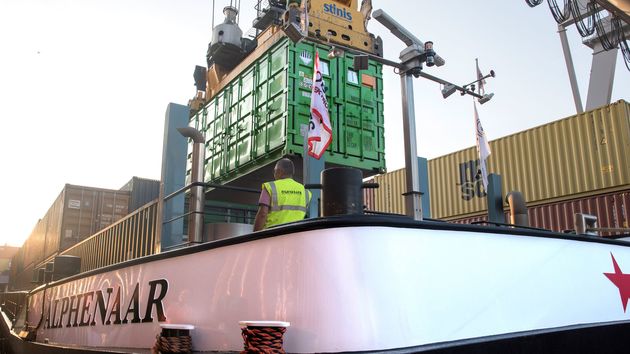On 6 September 2021, Zero Emission Services (ZES) will start shipping the Alphenaar, the first Dutch inland vessel to use interchangeable energy containers for propulsion.
The Alphenaar sails between Alphen aan den Rijn and Moerdijk for brewer Heineken, the first end customer of ZES.
This makes the commissioning of the innovative energy system of ZES for inland shipping a fact. The energy containers, ‘ZESpacks’, are standard filled with batteries, which are charged with green electricity. The first two ZESpacks are loaded and exchanged at the first charging station at the CCT terminal in Alphen aan den Rijn.
ZES has the ambition to scale up in the short term and wants to realize 30 zero-emission shipping routes by 2030. The company was founded last year by ENGIE, ING, Wärtsilä and the Port of Rotterdam Authority, with the support of the Ministry of Infrastructure and Water Management, and is thus taking an important step in the transition to emission-free inland shipping.
In order to achieve the goals of the Climate Agreement, the Green Deal for Sea Shipping, Inland Shipping and Ports has the ambition to reduce emissions in inland shipping by 50% by 2030. Achieving this goal requires a transition to fully electrically powered transport over water. ZES provides the solution to put this system change into effect, as it offers a service package based on exchangeable energy containers with green energy, open-access charging infrastructure and a pay-per-use payment concept for ship owners.
The charging stations can act as energy hubs that can stabilize the grid during peak loads and where other vehicles can also charge. Because of their mobility, ZESpacks can be used to supply and store energy at all kinds of locations, such as construction sites and festivals.
The energy concept that ZES is launching on the market contributes directly to the reduction of emissions by saving around 1,000 tons of CO2 and 7 tons of NOx per ship per year. In addition, ships sailing with ZES do not produce particulate matter and noise
says Willem Dedden, CEO of ZES.
The concept also includes the organization of the required charging infrastructure and a pay-per-use construction that allows skippers to pay only for the use of energy.
ZES also has the ambition to scale up to eight ships, eight loading stations and fourteen ZESpacks in the short term. The company wants to realize 30 zero-emission shipping routes by 2030, which can save up to 360,000 tons of CO2 and 2,800 tons of NOx.
In order to really compete with fossil fuels, simultaneous action and commitment from the government, ports and terminals as well as the business community are required.
ZES is now working closely with national, regional and local governments and forward-thinking carriers such as BCTN to contract the following vessels and develop the associated network of charging stations, starting in Rotterdam, Moerdijk and Alblasserdam.






























































